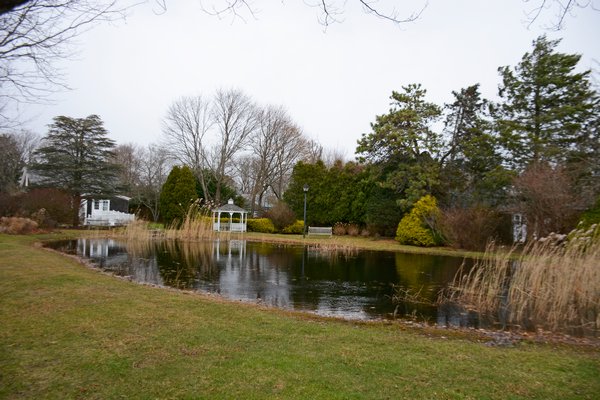
Joyce Flynn adjusted her hood to block her face from the cool winds sweeping across Lily Pond before reaching down into dirt. She pulls up some weeds and dead grass from among the juniper ground cover that has taken over a mound of stones at the head of the man-made pond.
At her side was Inger Mejean, the Westhampton Garden Club president, with her coat collar pressed high against her rosy cheeks and gloved hands combing through wilted shrubbery.
To them, a garden should never truly be “put to bed.” To have a lush and vibrant spring garden, hard work needs to be put in during the off-season, even after a brief sun shower on a frigid November day. It’s time to winterize the perennials by removing dead flowers and keeping the base of the plants free of leaves and debris.
“A gardener is always a gardener whether it’s spring, summer, fall or winter,” Ms. Mejean said.
When she held the title of president two years ago, Ms. Flynn began plotting and designing a native plant garden for the street corner by the Quogue Historical Society. On top of the showmanship of the club’s several garden festivals held throughout the year, the club contends it has an active role in conserving native plants, woodlands, open spaces and waterways in the region.
“I am really inspired by the idea of changing landscapes to exist in a post-wild world—essentially with a world that is becoming nothing but concrete, we have to do whatever we can to bring plants and gardens into that environment,” Ms. Flynn said.
“We are not just little old ladies sitting around putting flowers in a vase,” Ms. Mejean said. “We are very active in our community.”
With that idea in mind, the club took care of the Quogue Village green for about 50 years until the garden was taken out in recent years. Instead, the club was given the two gardens on the corner opposite the Quogue Village Police station. It was originally intended to be a drought-tolerant garden.
“But in my work to become a master gardener, I am learning that with climate change it’s not only the need for drought-tolerant, but also plants that can adapt to inconsistent rainfall and weather conditions,” Ms. Flynn said.
Last month, the club commissioned the aid of Sue Avery, the environmental chair of the Federated Garden Club of New York State and works on the Long Island Native Plant Initiative, to help winterize the Quogue native plant garden she helped design with Ms. Flynn in 2016, and to plan for new spring additions. Many of the plants were garnered from the initiative.
“It’s not easy to get native plants around here. It’s ironic that we need to ask around to find things that are supposed to grow here naturally, but are outcompeted by invasives,” Ms. Flynn said.
Their plan is simple: keep invasives out and let the native plants grow wild.
There are two plant beds. The smaller of the two is near a park bench and a gazebo near the historical society to the north, including butterfly weed, sweet pepperbush, slender golden top, coastal Joe Pye weed, stiff aster, bee balm and narrow leaf mountain mint. Deer ate all of the swamp milkweed this fall, so more needs to go into the ground. In a crescent-shaped bed much of that flora flourishes next to hyssop-leaved thoroughwort, beach plum, Indian grass and blue verbena.
They’re all perennial and bloom at different times during the year for year-round beauty.
“We are not cutting any beds,” Ms. Mejean said. “We are leaving it as is, so insects and birds can still benefit from the garden. I think it’s just beautiful.”
What does get removed are invasive species like phragmites, or the common reed that has a deep root system growing down into the pond, which takes resources away from native plants
And of course, lily pads float on the surface of Lily Pond. During the summer months, the corner has a rich ecosystem with bullfrogs leaping into the pond to evade the herring’s beak. The native plants attract pollinators like butterflies and bees. Monarch butterflies are attracted to the milkweed.
“It’s an aesthetic that we have cultivated over many years to have manicured lawns that I am sad to say provide no environmental benefit,” Ms. Flynn said. “We are hopeful that once people see that they are maintenance-free, beautiful and good for the environment that it will encourage them to use them and produce them.”